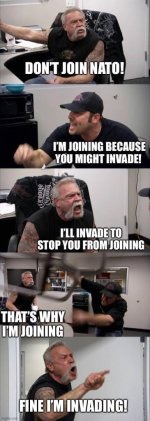There is a thesis propounded by many that NATO expansion to the east after the collapse of the Soviet Union was a mistake. This thesis was shared by George Kennan, one of the architects of NATO, who said in the late 90s, when the expansion was taking place, that it was a mistake, that NATO was founded purely as a bulwark against Soviet aggression in Western Europe and with the demise of the Soviets, it had lost is reason for existence and certainly had no reason to expand. I have always had some sympathy for this argument.
The Soviet Union ceased to exist, the change in ownership didn't change the basic reason for the existence of NATO. The threat remained.
Well, the basic reason for NATO, as Kennan pointed out, was to be a bulwark against SOVIET expansion into WESTERN Europe. After 1991, the “Soviet” part ceased to exist, and the threat to Western Europe vanished because the Russians evacuated Eastern Europe and its own Warsaw Pact alliance was dissolved.
Moreover, the U.S. promised Gorbachev, when he agreed to quit Eastern Europe, that there would be no NATO expansion eastward. Gorbachev himself recently reiterated this. So the West went back on its word.
Now, as the rest of my post that you quoted pointed out, in
retrospect it may be a good thing that NATO expanded eastward. But the future was very much up in the air at the time.
I distinctly recall at the time, during the Clinton administration, discussion along a much more radical line: expanding NATO eastward but only in the context of inviting Russia itself to join NATO, thereby effectively creating a grand alliance without an enemy.
This was predicated on the assumption that Russia would become a “normal” nation along Western lines, but that obviously did not happen. Why not?
It seems to me that one big reason is that the Austrian school economists, the Libertarians, the Ayn Randites and suchlike idiots pushed for, and got, an instant, “shock therapy” transition to capitalism in Russia. This had devastating consequences, with mass unemployment, soaring inflation and other defects of the dog-eat-dog doctrine of economics. Russia went through a decade of penury and it soured tens of millions on the Western economic, social and political model. Then Putin came along in 1999 and in the next decade Russia began to recover, mainly because of the energy sector. Thus millions put their (misplaced) trust in Herr Putin. Even today polls show that about half of Russians long for a return of the cosseting system of shared scarcity that prevailed under the Soviets.
Had Russia transitioned gradually into a quasi-Western system with Russian characteristics, and had it adopted a Scandinavian model of social arrangements (which the U.S. ought to do as well), things might have been very different and Russia might well today be a more or less “normal” country with a decent president and authentic elections — and posing no threats to its neighbors.


